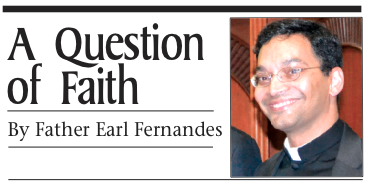Q&A: Has the church been clear on embryonic stem cells?
Dear Father: In the past my husband and I have donated to various organizations, only to learn that they use donations for embryonic stem cell research. While they do much good, they still support this practice. We have stopped giving, but I also know a lot of Catholics who donate to these groups. I do not think the church has been clear about the practice of using embryonic stem cells for research. If the church is really opposed to it, why do so many Catholics donate without knowing the facts about this type of research?
Dear Reader: Catholic teaching on embryonic stem cell research is clear. In 1987, the Congregation for the Doctrine of the Faith issued an instruction entitled Donum Vitae and another instruction in 2008, entitled Dignitas Personae. In each case, the human embryo ought to be treated as a person and to be afforded the rights and protections of a person, including the right to life. Proposals to use embryos for research or for the treatment of disease are unacceptable because they treat the embryos as mere “biological material” and result in their destruction. When a Catholic hears the word “embryo,” he or she should think “person.” We would never experiment on a person without his or her consent. We would never experiment on a person and directly kill the person, especially an innocent one. That is the reality of what embryonic stem cell research does, which is why Catholics should reject it.
The use of embryonic stem cells for both therapy and research is basically the harvesting of human embryos (persons) for medical use. Aside from the moral component of the problem, embryonic stem cell research has not produced the many treatments and cures that were promised. Even if cures were obtained, the ends never justify the means in Catholic morality. We cannot do evil that good may come of it.
The church is not opposed to all stem cell research. Adult stem cell research or use of stem cells such as those that come from cord blood is licit. There has been great success with the use of adult stem cells which are easily obtained. This issue draws the medical profession into the life politics of our society. The use of embryos seems to be an ancillary issue under the larger umbrella of pro-abortion politics and therefore objective research is easily skewed in favor of a devaluation of human life. Dr. Vincent Pompili of the Ohio State University College of Medicine is a very articulate spokesperson for the problematic use of embryonic stem cells and the valuable use of adult stem cells. He speaks about this issue on the basis of scientific research and medical practice alone.
Many Catholics donate to organizations that promote this serious assault on human life? It would seem that would be a form of material cooperation in a grave and intrinsic evil. The Catholic ought not to cooperate with evil, especially when alternatives exist, or when cooperation in evil can be avoided. We can understand, without justifying the practice, how many parents give to these organizations because their child is sick. Many of these organizations promise not to use a particular donation for unacceptable research and allow people to restrict a donation so that it will not be used for the questionable practices. That can easily be a type of “shell game,” using funds to free up someone else’s for immoral purposes. It would be better to thoroughly investigate charities before investing in their work. Those who move funds around as a marketing tool are best avoided and those who give an honest accounting of the use of charitable donations are a much safer and worthwhile investment.
I t is often difficult to peel away the layers of market presentation and clarify the actual intentions of the charitable organization. Different kinds of alliances, hidden recipients and deeply political agendas are part of modern practices of many large charitable organizations. While one is not always able to uncover everything, as Catholics, we should exercise a reasonable “due diligence” in investigating the use of donated funds. It is unfortunate that these extra efforts should become necessary when transparency on the part of those organizations charged to manage public generosity would solve the problem. In our highly charged political environment, these extra precautions on our part are the only way to ensure that we are fulfilling our Christian duty to help our neighbor in a moral and truly humane way. If charity is not moral and humane, it really is not charity.
Father Fernandes is dean of Mount St. Mary’s Seminary and the Athenaeum of Ohio, where he is assistant professor of moral theology. To ask Father Fernandes a question about the faith, send an email to Steve Trosley or write to The Catholic Telegraph, 100 East Eighth Street, Cincinnati, OH 45202.
This A Question of Faith column originally appeared in the April 2014 print edition of The Catholic Telegraph.














